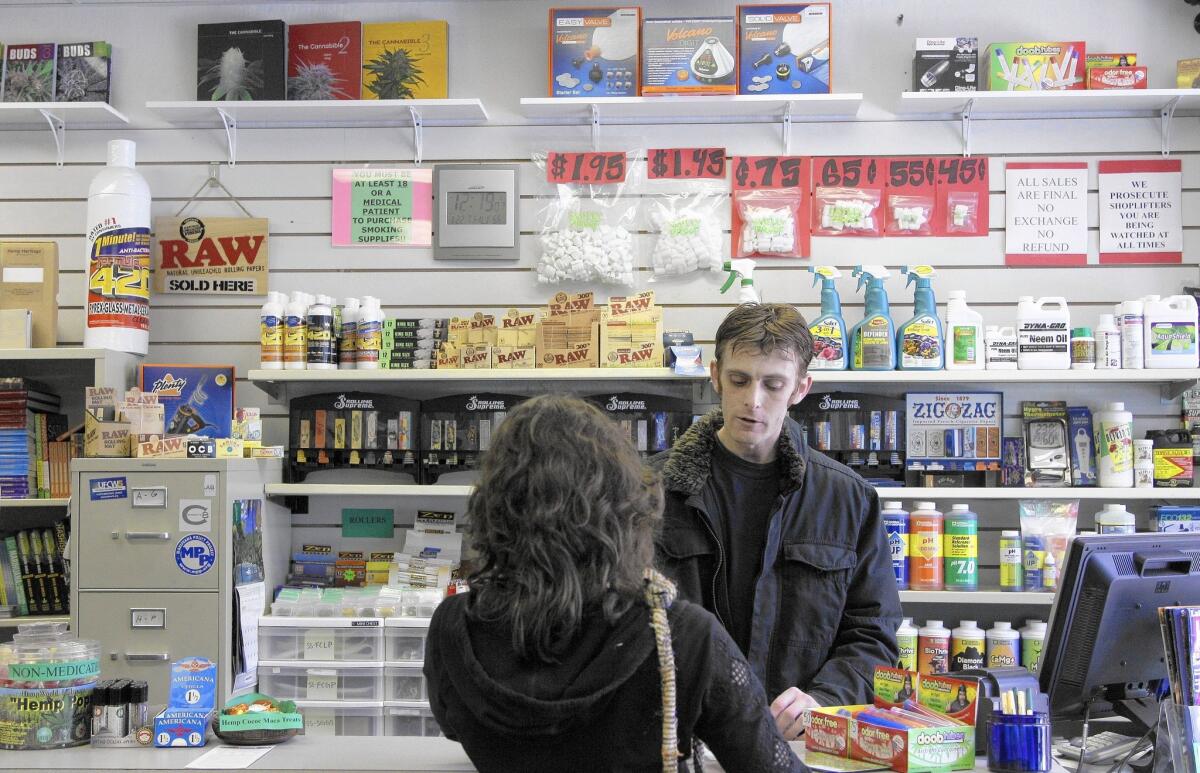Marijuana dispensaries need banking access, California officials say

- Share via
Reporting from SACRAMENTO — Citing the public safety risks of a cash-only industry, state officials argued Friday that medical marijuana dispensaries should have better access to banking.
A member of the state’s tax board convened a meeting to discuss the banking challenges currently facing the cannabis industry. Most financial institutions refuse to serve marijuana businesses, pointing to federal law that classifies pot as an illegal substance.
State lawmakers are considering a resolution that would urge the president and Congress to support legislation allowing banks and credit unions to serve state-legalized marijuana businesses.
“Something has to change, and we have to be creative about what we are doing,” said Fiona Ma, a member of the Board of Equalization, which carries out tax policy and considers appeals from businesses and residents.
Without access to bank accounts, medical marijuana dispensaries often pay sales tax by hauling large bags of cash to the board’s office, said Ma, who convened the meeting. Transporting large amounts of cash can pose a safety risk to the community, as it often encourages crime and violence, state government officials said.
Board member George Runner recalled one dispensary that brought a bag filled with $200,000 into the Sacramento district office.
“That’s just dangerous all around,” Runner said.
Cash-only operations are also more difficult for the board to audit because these businesses do not have access to the same banking documents, Runner said. He argued that letting banks offer services to marijuana businesses would streamline the auditing process — and increase compliance to tax law.
State voters approved a measure in 1996 to legalize medical marijuana. But the federal government still considers the drug a Schedule 1 controlled substance, which is illegal to possess.
Due to this conflict between state and federal law — along with existing federal regulations that require financial institutions to assist the government in detecting criminal activity — most banks have chosen not to serve marijuana businesses, said David Thomas, senior manager of the Federal Reserve Bank of San Francisco’s Financial Institution Supervision and Credit division.
Currently, 105 financial institutions are engaged in banking with medical marijuana dispensaries, Thomas said.
Janet Sanchez, senior vice president of Community Credit Union of Southern Humboldt, said her institution would serve dispensaries if it weren’t for the federal regulations.
“We have opened a handful of cannabis-related accounts in the past,” Sanchez said. “The due diligence, the ongoing monitoring, the granular reporting, the incredible financial and staff time that it takes to deal with these accounts is overwhelming and not worth it.
“Frankly, most financial institutions are going to make the smart business decision of not participating,” she said.
Cannabis industry representatives said it is time for the federal government to take action and recognize state-legalized medical marijuana dispensaries.
“This is a legitimate business, and the federal government just fails to recognize it as such,” said Henry G. Wykowski, an industry attorney.
kurt.chirbas@latimes.com
Twitter: @kchirbas
More to Read
Sign up for Essential California
The most important California stories and recommendations in your inbox every morning.
You may occasionally receive promotional content from the Los Angeles Times.













